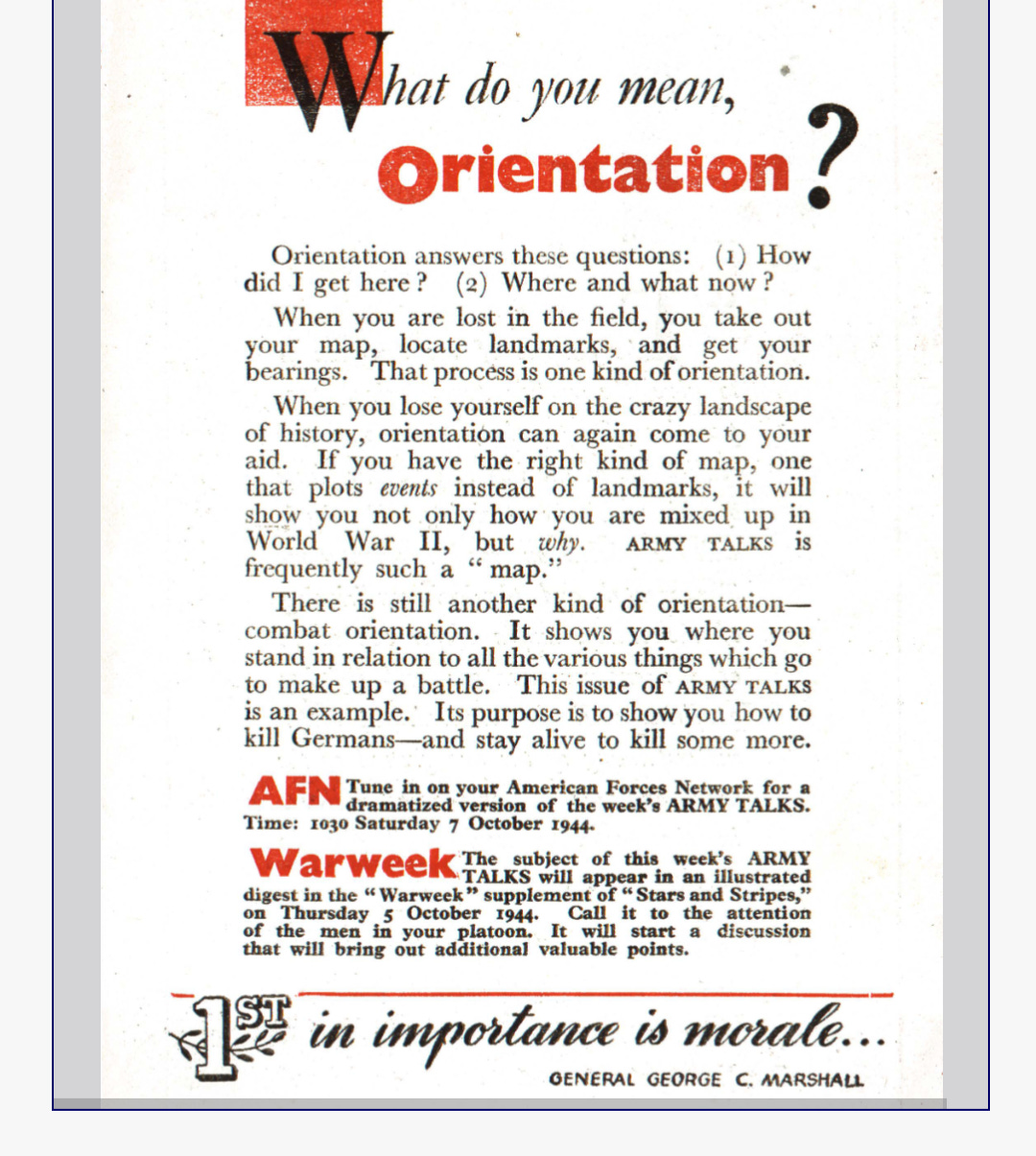"Fascism!", Trump, and the 1945 War Department
On her blog “Letters from an American,” the historian Heather Cox Richardson has posted a very interesting set of excerpts from a pamphlet published in March of 1945 by the U.S. Department of War (now known by the more anodyne name the Department of Defense). The pamphlet, entitled “Fascism!,” bills itself as a “fact-sheet.” It was issued by Army Talks magazine, which gave soldiers information on army procedures—and pushed on them the department’s official line on various topics.
This “Fascism!” sheet came out only two months before Germany’s unconditional surrender to Allied forces, which already seemed assured. Looking to the future, then, the pamphlet gives a history of the rise of fascism in Europe and addresses the classic “can it happen here” question regarding the U.S., arriving at a decided Yes.
Reasons for reviving a nearly eighty-year-old government document include, of course, the rise of MAGA, suspense over next week’s presidential election, and the potential for fascist developments here if Trump is elected again. The sense of the post seems to be that as long ago as 1945, our government—specifically the department responsible for defeating fascism in WWII—possessed a keen, even prescient awareness of the dangers posed today by Trumpism, so maybe we should listen anew to our wartime government’s warnings? Take its advice for assessing our fellow citizens’ relative loyalty to the fundamental American values?
I was happy to find out about the Army Talks publications, a weird and interesting mix, right up my alley. Some, like the “Fascism!” fact-sheet, which was published as the basis for an organized discussion, can get pretty high-flown and ideas-oriented, in the patronizing way of such efforts: Joe Averageman questions as a pretext for giving pre-digested answers (“Question: How can we identify native American fascists at work?” “An American fascist seeking power would not proclaim that he is a fascist…”).
But most of the articles seem to be more like the September 1944 tell-it-like-it-is cover story, which uses the colloquial, hardboiled, intimate style of the men’s slicks of the period to remind troops who have spent the war spinning their wheels in backwater assignments that, as of now, they’re going into combat:
Sometimes you’ve wondered whether Uncle had good sense. You’ve said you wish to God somebody, somewhere, would make up his mind what they’re going to do with you—and do it. You’re tired of being an unwanted stepchild. Well, Orphan Annie, your freshman days are over. [. . .] If you’ve made the most of your placement training you’ll throw Herman the German for a loss. If you haven’t, you'll find out the hard way the reasons behind the things they tried to teach you in basic. [. . .] Incidentally, don’t forget you’ve got the weapons on your side. Sure, the German 88 is good, but the Long Toms don't take back-talk from anybody. Ask any Kraut what he thinks of our bazooka, our rocket planes, our tanks, our fire power in general. . . .
All with cartoon illustrations. The same issue has an article entitled “What the German Prisoners Say about YOU.” Fake interviews with “Boche” POW’s lead to fake quotes revealing the prisoners’ supposedly dim view of the quality of US soldiers.
I especially like this exchange:
Asked what he planned to do when the war was over,
“Go to America,” [a prisoner] answered.
“Why? You won’t like it very much over there. We believe in electing our leaders. We don’t go into people’s homes and beat them up or confiscate their property. We don’t roast them alive in ovens. We say what we think, read what we like and do what we please.”
The storm trooper shrugged.
“Yah,” he commented,” but we’ll change all that.”
This writing style is vaguely familiar to me, I think because when my father was discharged, in ’46, the grab-bag of Army fatigue jackets and sergeant stripes he took with him included a few manuals covering hand-to-hand self-defense, how to hold up under interrogation, how to communicate with Pacific islanders, and related matters. Twenty years later, my brothers and I were poring over those books: this info could definitely come in handy!
So might, to a WWII soldier, Army Talks’s injunctions against complaining, pointers on staying alive in combat, reminders to take care of your gun, and explanations of the operations, sometimes frustrating to soldiers, required by mass movements of troops. Useful stuff, wrapped in ceaseless propaganda.
The 1945 “Fascism!” fact-sheet is propaganda too. Particularly intriguing propaganda.



